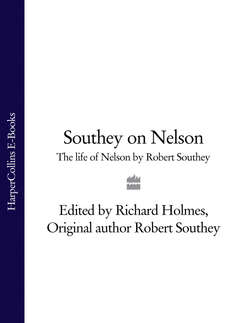Читать книгу Southey on Nelson: The Life of Nelson by Robert Southey - Richard Holmes - Страница 4
INTRODUCTION 1
ОглавлениеOnce he became a fleet-commander, Nelson always liked to lead his ships into battle flying naval signal number sixteen from his topgallant mast-head. Signal number sixteen consisted of two flags, one above the other: the uppermost white with a blue cross, the one below a patriotic red, white and blue. Even at the battle of Trafalgar, after he had issued the immortal message ‘England expects that every man will do his duty’, Nelson hoisted signal number sixteen as his last general command to his battle fleet.
Its meaning was a dare as much as an order, and it was particularly relished by his officers, his ‘band of brothers’, who considered it typical of Nelson’s attitude to life in general. Signal number sixteen, applicable in all conceivable circumstances, meant: ‘Engage the enemy more closely’.
It was flying at 1pm on 21 October, 1805, when Nelson was hit by a musket ball on the quarter deck of the Victory; and it was still flying when he died three hours later, in the surgeon’s cockpit, asking Captain Hardy to kiss him farewell, and to tell him how many enemy ships had surrendered.
